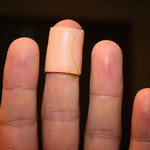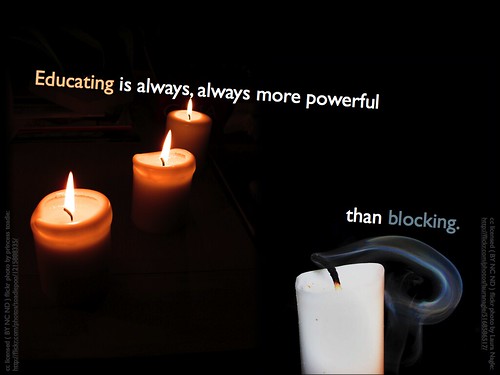Digital Citizenship Using Visual Metaphors
11/10/2014 08:00:00 amWhile Digital Citizenship Week has come and gone it's important to keep the conversations going. If you missed Digital Citizenship week it's never too late to get started.

I've included Craig's original list of items and a few other suggested by people who commented on his blog. I've also added a few of my own nuances and additional resources for teachers to use with their students.
The Digital Citizenship Survival Kit



Padlock: Padlocks are used to secure the stuff kids keep in their lockers. It's also a reminder to keep your online passwords secure and private to protect your online stuff.
Toothbrush: In the same way you wouldn't share your toothbrush with someone else, don't share your passwords.
House Key: Younger students can be reminded that their passwords are like their house keys; only to be shared with trusted family members like their Mom and Dad.



Permanent Marker: Remember that what you "write" online stays online. Even SnapChats aren't really deleted when you know that apps like SnapHack exist.
Toothpaste: In the same way you can't get toothpaste back in the tube once it's out, you can't always unpublish what you've shared online. Think before you post:
Bar of Soap: Try to keep it "clean" online. You can check your social media footprint using free sites like Reppler; try it now.



Picture of Grandma: It’s not really about only publishing stuff you’d be happy for your grandmother to see; it’s more personal than that:
Coffee Filter: Don’t believe everything you find online, apply a critical thinking filter to everything you see. For schools, remember the best internet filters are the one’s we help students install in their own heads.
I'm in favor of internet filters. I just want to move them from the router to my students' heads. #edcamplbc
— David Wees (@davidwees) November 17, 2012

Bandaid: Don’t use words that hurt; use words that heal. Do One Good Thing. Better yet, have your kids discuss what one good thing they might do and have them share it like the kids in the videos below. Start planning now for Safer Internet Day; the second Tuesday in February. This year that will be 10 Feb 2015. (The first video in the playlist below might be a good conversation starter around the idea of doing one good thing.)
There are many more good ideas for visual metaphors in Craig’s update to his original blog post: The "New and Improved" Digital Citizenship Survival Kit. (The crumpled paper is my favourite.)
Let me know how it goes if you use any of these ideas in your classes.
photo credits: creative commons licensed (BY-NC-SA) flickr photo by Dan Callahan, creative commons licensed (BY-NC-SA) flickr photo by dkuropatwa, creative commons licensed (BY) flickr photo by Sh4rp_i, creative commons licensed (BY-NC-SA) flickr photo by Dave Lanovaz, creative commons licensed (BY) flickr photo by walknboston, creative commons licensed (BY-NC-ND) flickr photo by LuluP, creative commons licensed (BY-NC-SA) flickr photo by gorgeoux, creative commons licensed (BY) flickr photo by mauren veras, creative commons licensed (BY-NC-SA) flickr photo by Monimix, creative commons licensed (BY-NC-SA) flickr photo by tonx, creative commons licensed (BY-NC-ND) flickr photo by jugbo


2 comments
Hi Darren,
ReplyDeleteThis is a great post! I really like the idea of using visual prompts to lead a discussion. In my school we practise digital citizenship through various ways, one of the ways is to have a pastoral care assembly where we teach a concept and then have a discussion. You blog has given me lots of ideas to implement in our pastoral care assemblies.
I really like the ideas of filters and Davids tweet about moving them from the router to his students' heads. This is something I have been working on for sometime all the more because we are located in China and it becomes hard to implement a lot of good research websites as there are a lot of restrictions in using popular search engines which can filter content. So our best bet is to educate our students.
Another idea that I would like to implement in my school is the 'Safer internet day' This really resonates with me and has given me a lot of food for thought.
Thanks.
Cheers,
Amita
Excellent information, thank you. As a doctoral student (education) I often wonder why these common sense elements have eluded educators and adult students. All too often I see folks making comments in social media or my online classroom as though the group were closed to anyone but the reader. Not so, and the snowball effect from a momentary rant can be devastating, especially professionally.
ReplyDeleteI find that my cohorts respond well to visual reminders, so I love yours, especially the permanent marker. I will be promoting several of these!
Thank you again,
Sherry.